Parlophone
Parlophone Records Limited (also known as Parlophone Records and Parlophone) is a German–British record label founded in Germany in 1896 by the Carl Lindström Company as Parlophon. The British branch of the label was founded on 8 August 1923 as the Parlophone Company Limited (the Parlophone Co. Ltd.), which developed a reputation in the 1920s as a jazz record label. On 5 October 1926, the Columbia Graphophone Company acquired Parlophone's business, name, logo, and release library, and merged with the Gramophone Company on 31 March 1931 to become Electric & Musical Industries Limited (EMI). George Martin joined Parlophone in 1950 as assistant label manager, taking over as manager in 1955. Martin produced and released a mix of recordings, including by comedian Peter Sellers, pianist Mrs Mills, and teen idol Adam Faith.
| Parlophone Records | |
|---|---|
 | |
| Parent company |
|
| Founded | 1896 (as Parlophon Parlograph Company) (subsidiary of the Carl Lindström Company until 1926) |
| Founder | Carl Lindström |
| Distributor(s) |
|
| Genre | Various |
| Country of origin | United Kingdom |
| Official website | parlophone |
In 1962, Martin signed the Beatles, a beat group from Liverpool who had just been rejected by Decca Records. During the 1960s, when Cilla Black, Billy J. Kramer, the Fourmost, and the Hollies also signed, Parlophone became one of the world's most famous labels. For several years, Parlophone claimed the best-selling UK single, "She Loves You", and the best-selling UK album, Sgt. Pepper's Lonely Hearts Club Band, both by the Beatles. The label placed seven singles at number 1 during 1964, when it claimed top spot on the UK Albums Chart for 40 weeks. Parlophone continued as a division of EMI until it was merged into the Gramophone Co. on 1 July 1965. On 1 July 1973, the Gramophone Co. was renamed EMI Records Limited.
On 28 September 2012, regulators approved Universal Music Group's (UMG) planned acquisition of EMI on condition that its EMI Records group would be divested from the combined group. EMI Records Ltd included Parlophone (except the Beatles' catalogue) and other labels to be divested and were for a short time operated in a single entity known as the Parlophone Label Group (PLG), while UMG pended their sale. Warner Music Group (WMG) acquired Parlophone and PLG on 7 February 2013, making Parlophone their third flagship label alongside Warner and Atlantic. PLG was renamed Parlophone Records Limited in May 2013. Parlophone is the oldest of WMG's "flagship" record labels.
History
Early years
Parlophone was founded "Parlophon" by Carl Lindström Company in 1896.[1] The name Parlophon was used for gramophones before the company began making records of their own. The label's ₤ trademark is a stylised blackletter L () that stands for Lindström. (It coincidentally resembles the British pound sign £, which is derived from the letter L for the Ancient Roman unit of measurement libra, which means pound (weight) in Latin.) On 8 August 1923, the British branch of "Parlophone" (with the "e" added) was established, led by A&R manager Oscar Preuss.[1] In its early years, Parlophone established itself as a leading jazz label in Britain.[2]
EMI years and initial success
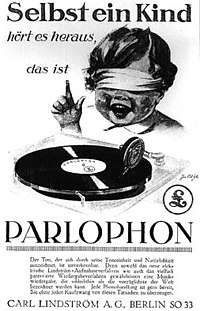
In 1927, the Columbia Graphophone Company acquired a controlling interest in the Carl Lindström Company, including Parlophone.[1] Parlophone became a subsidiary of Electric & Musical Industries (EMI), after Columbia Graphophone merged with the Gramophone Company in 1931.[3]
In 1950, Oscar Preuss hired producer George Martin as his assistant. When Preuss retired in 1955, Martin succeeded him as Parlophone's manager. Parlophone specialized in mainly classical music, cast recordings, and regional British music,[4] but Martin also expanded the reach into novelty and comedy records. A notable example was The Best of Sellers, a collection of sketches and comic songs by Peter Sellers undertaken in the guise of a variety of comic characters.[5] It reached number three in the UK Albums Chart in 1958. Musicians signed to the label included Humphrey Lyttelton and the Vipers Skiffle Group.[6]
A consistently successful act for Parlophone was teen idol Adam Faith, who was signed to the label in 1959.[7] The label gained significant popularity in 1962 when Martin signed Liverpool band the Beatles.[3] Parlophone gained more attention after signing the Hollies, Ella Fitzgerald, and Gerry and the Pacemakers in the 1960s.[8] Martin left to form Associated Independent Recording (AIR) Studios in 1965.[9]
Parlophone became dormant in 1973 when most of the heritage labels were phased out in favor of EMI Records.[10] Parlophone was revived in 1980.[11] During the next decades the label signed Pet Shop Boys, Duran Duran, Roxette, Radiohead, Supergrass, Guy Berryman, the Chemical Brothers, Blur, Coldplay, Kylie Minogue, Damon Albarn, Conor Maynard, Gabrielle Aplin, and Gorillaz.[12]
On 23 April 2008, Miles Leonard was confirmed as the label's president.[13]
EMI merging with UMG and WMG acquisition
On 28 September 2012, regulators approved Universal Music Group's planned acquisition of Parlophone's parent group EMI for £1.2 billion, subject to conditions imposed by the European Commission requiring that UMG sell off a number of labels, including Parlophone itself (aside from the Beatles' catalogue, which was kept by UMG and moved to Universal's newly formed Calderstone Productions), Chrysalis, Ensign, Virgin Classics, EMI Classics, and EMI's operations in Portugal, Spain, France, Belgium, Denmark, Norway, Sweden, Czech Republic, Slovakia, and Poland.[14] These labels and catalogues were operated independently from Universal as Parlophone Label Group to prepare for a transaction early in 2013. UMG received several offers for PLG, including those from Island founder Chris Blackwell, Simon Fuller, a Sony/BMG consortium, Warner Music Group, and MacAndrews & Forbes.[15][16][17]
On 7 February 2013, it was confirmed that Warner Music Group would acquire Parlophone Label Group for US$765 million. The deal was approved in May 2013 by the European Union, which saw no concerns about the deal because of WMG's smaller reach compared to the merged UMG and Sony. Warner Music closed the deal on 1 July. Parlophone Label Group was the old EMI Records label that included both the Parlophone and the eponymous EMI labels. The EMI trademark was retained by Universal (as Virgin EMI Records) while the "old" EMI Records became defunct and was renamed "Parlophone Records Ltd."
Soon after acquiring Parlophone, WMG signed an agreement with IMPALA and the Merlin Network (two groups which opposed the EMI/Universal deal) to divest $200 million worth of artists to independent labels in order to help offset the consolidation triggered by the merger.[18][19] In April 2016, the back catalogue of British rock band Radiohead, who had sued Parlophone and EMI over a dispute in music royalties, was transferred to XL Recordings.[20] It is distributed in the US by Parlophone's sister company Alternative Distribution Alliance (ADA).
WMG treats Parlophone as its third "frontline" label group alongside Atlantic and Warner.[21] In the US, most of Parlophone's artists are now distributed under Warner Records. The only exceptions concern Dinosaur Pile-Up, distributed by Roadrunner Records, Coldplay and Tinie Tempah, both distributed under Atlantic Records, and David Guetta, distributed under Atlantic's electronic music imprint Big Beat Records.[22]
The Beatles
Parlophone released the Beatles' albums up to Sgt. Pepper's Lonely Hearts Club Band. Subsequent releases – The Beatles (also known as the "White Album"), Yellow Submarine, Abbey Road and Let It Be – were issued on the Beatles' Apple record label, distributed by EMI and bearing Parlophone catalogue numbers.
The Beatles deal is one of the cheapest made by Parlophone.[23] Despite the separation of Parlophone from EMI as a condition of EMI's acquisition by UMG, Universal was allowed to keep the Beatles' recorded music catalogue, which was assigned to the subsidiary Calderstone Productions.[24]
Roster
Parlophone's roster includes many popular music artists. Its contemporary HMV was more of a classical music label and ceased issuing popular music recordings in 1967; later known as EMI Classics, it was absorbed into Warner Classics in 2013; English Columbia was replaced by the EMI pop label. Parlophone also operates Regal, a contemporary revival of the historic Columbia Graphophone budget/reissue label founded in 1914. The list records those who achieved notability.
Parlophone record labels
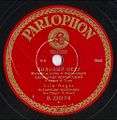 Vertinsky Parlophone B.23017, made in Germany
Vertinsky Parlophone B.23017, made in Germany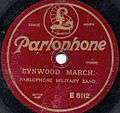 Early 20th century Parlophone record label of the 78rpm acoustic era
Early 20th century Parlophone record label of the 78rpm acoustic era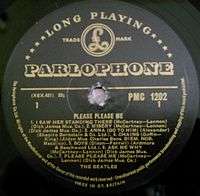 Please Please Me by the Beatles (side 1) – 1963. Parlophone gold and black label
Please Please Me by the Beatles (side 1) – 1963. Parlophone gold and black label- With the Beatles (side 1) – Parlophone yellow and black label
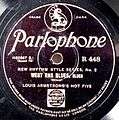 West End Blues, British Parlophone record
West End Blues, British Parlophone record
The labels shown here include those used for 78s and LPs. The label design for 7" singles had the same standard template as several other EMI labels, with the large "45" insignia to the right. In recent years, design uniformity has relaxed from release to release.
References
- Womack, Kenneth (30 June 2014). The Beatles Encyclopedia: Everything Fab Four. ABC-CLIO. pp. 711–. ISBN 978-0-313-39172-9. Retrieved 26 December 2018.
- Garside, Juliette (7 February 2013). "Warner Music buys Parlophone label". the Guardian. Retrieved 2 August 2018.
- "BBC News | BUSINESS | EMI: A brief history". news.bbc.co.uk. 24 January 2000. Retrieved 2 August 2018.
- Owsinski, Bobby (14 March 2016). "How George Martin Changed The Finances Of The Record Business". Forbes. Retrieved 2 August 2018.
- Hall, Julian (2006). The Rough Guide to British Cult Comedy. London: Rough Guides. ISBN 978-1-84353-618-5.
- Frame, Pete (4 November 2011). The Restless Generation: How Rock Music Changed the Face of 1950s Britain. Omnibus Press. pp. 616–. ISBN 978-0-85712-713-6. Retrieved 26 December 2018.
- Thompson, Gordon (10 September 2008). Please Please Me: Sixties British Pop, Inside Out. Oxford University Press. pp. 291–. ISBN 978-0-19-971555-8. Retrieved 26 December 2018.
- "Ron Richards: Record producer who worked with the Beatles". The Independent. 11 June 2009. Retrieved 2 August 2018.
- Farquhar, Peter (14 March 2016). "A photographer was in George Martin's abandoned AIR studio the week he died". Business Insider Australia. Retrieved 2 August 2018.
- "EMI Label Launch Spurs Logo Plan". Google Books. Billboard/Nielsen Business Media. 3 February 1973. Retrieved 1 March 2013.
- "ATV Northern Developing Production Ties to EMI". Google Books. Billboard/Nielsen Business Media. 13 September 1980. Retrieved 1 March 2013.
- "Warner Music Group Integrates Parlophone Roster, Including Coldplay, David Guetta and Pink Floyd". The Hollywood Reporter. 19 December 2013. Retrieved 2 August 2018.
- "EMI Rings Changes". Music Week. 23 April 2008. Retrieved 16 February 2011.
- Ingham, Tim (26 November 2012). "Universal's Capitol takes shape: Barnett in, Beatles on roster". Music Week. Intent Media. Retrieved 18 April 2013.
- Sweney, Mark (21 September 2012). "Universal's £1.2bn EMI takeover approved – with conditions". The Guardian. London. Retrieved 21 September 2012.
- Pakinkis, Tom (15 November 2012). "Nine groups in Parlophone race, 12 eyeing other UMG/EMI assets". Music Week. Retrieved 1 March 2013.
- Negishi, Mayumi (7 January 2013). "Sony, BMG in joint bid for Parlophone, EMI labels". Reuters. Retrieved 1 March 2013.
- Sisario, Ben (15 May 2013). "Warner Music Gains Approval to Buy Parlophone, a Last Piece of EMI". The New York Times. Retrieved 17 May 2013.
- Sisario, Ben (19 February 2013). "Warner Music Makes a Deal With Small Labels". The New York Times. Retrieved 17 May 2013.
- "Radiohead's Early Catalog Moves From Warner Bros. to XL". Billboard.com. 4 April 2016. Retrieved 5 April 2016.
- "Warner Music Group Outlines Parlophone Integration Process, Expects $70 Million in Annual Cost Savings". Billboard.com. 25 April 2013. Retrieved 30 January 2014.
- "Coldplay, David Guetta Go To Atlantic Records; Radiohead & Pink Floyd Catalogs, Kylie Minogue, Damon Albarn To Warner Bros: WMG's US Plans for Parlophone". Billboard.com. 18 December 2013. Retrieved 30 January 2014.
- "The Beatles Biography". Retrieved 29 September 2012.
- "The Beatles, Universal, and Calderstone Productions". thoughtco.com. 6 March 2017. Retrieved 29 May 2017.